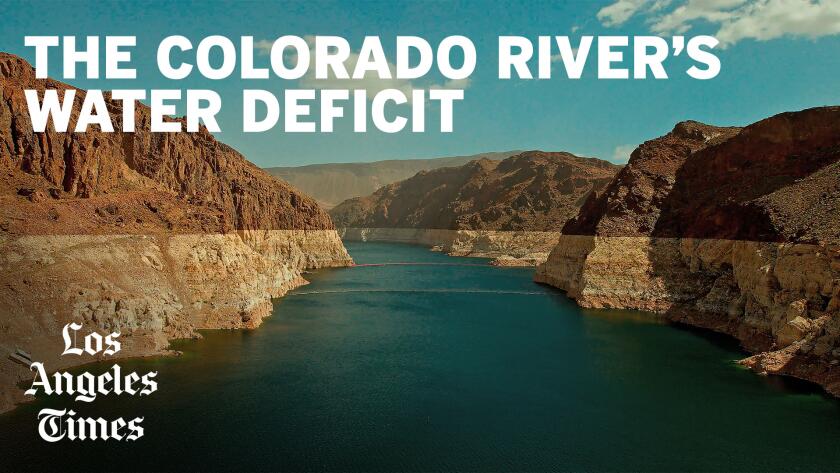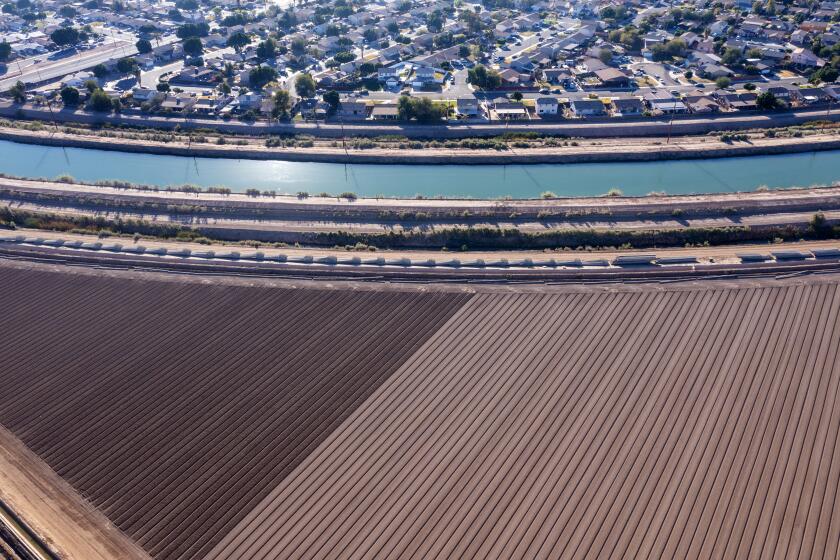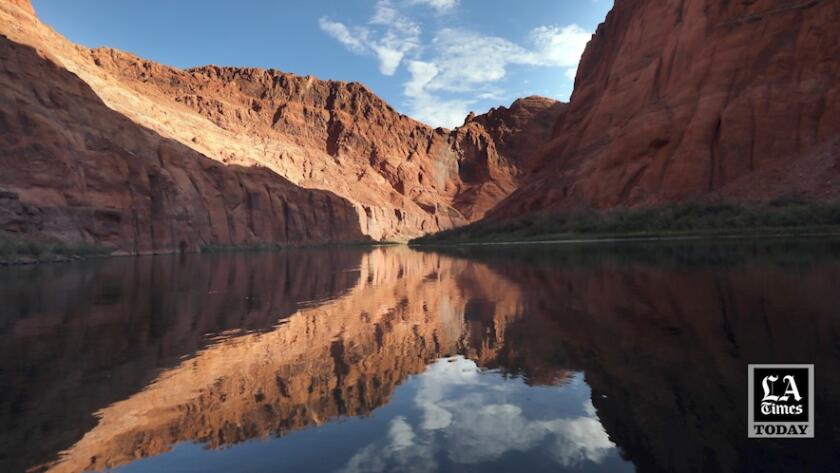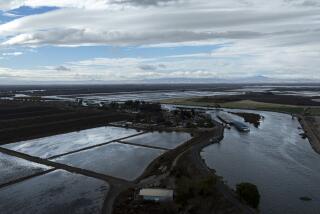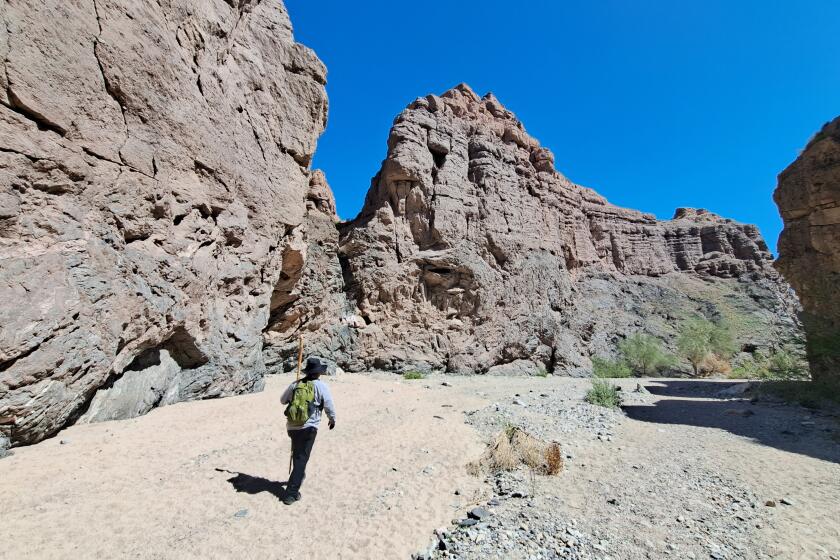California emerges as big winner in Colorado River water deal
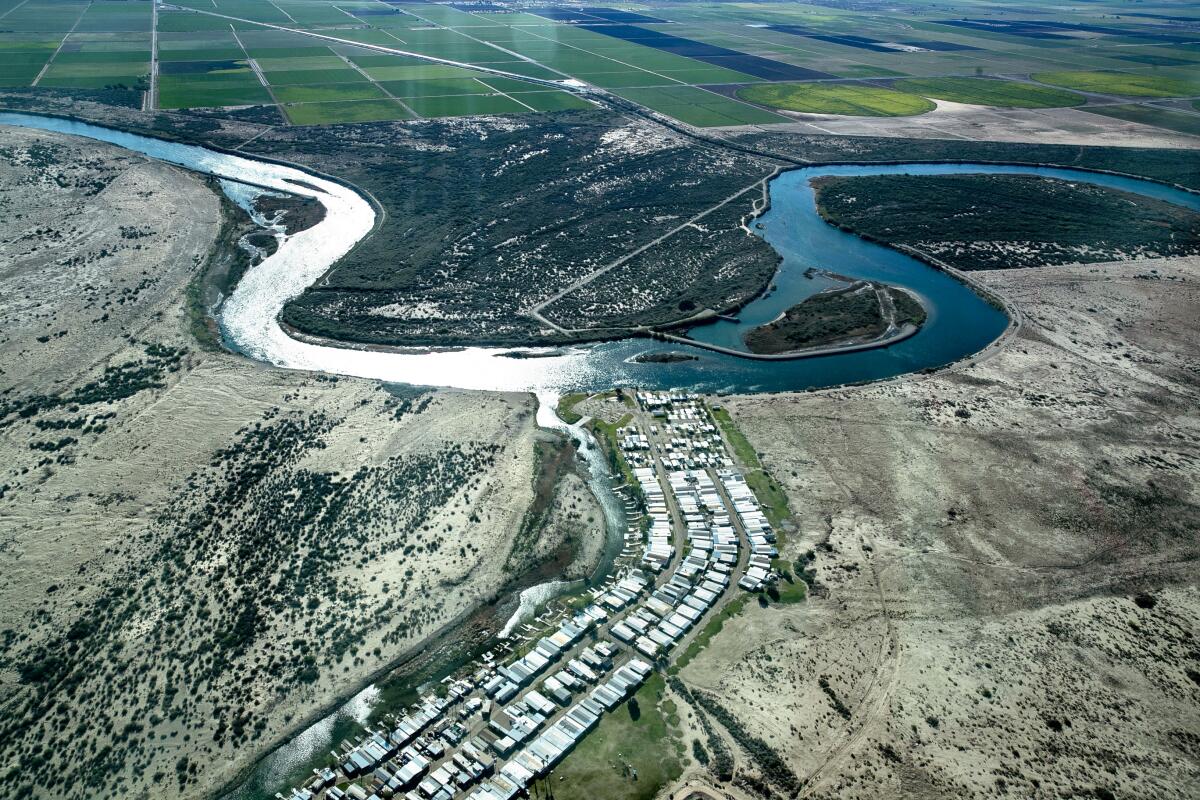
Monday’s historic Colorado River agreement represents a big win for California, which only months ago was embroiled in a bitter feud with Arizona, Nevada and four other Western states over how to dramatically reduce their use of water supplies in the shrinking river.
The proposition, which came after months of tense negotiations, would see the three states in the Colorado’s lower basin conserve about 3 million acre-feet of water from the river by 2026 — a 14% reduction across the Southwest that amounts to only about half of what could have been imposed by the federal government had the states not come to an accord.
“It’s a win for California, but it’s a win for the entire basin that, once again, after a year of acrimony, we are at least now on the same page going forward,” said Bill Hasencamp, manager of Colorado River resources for the Metropolitan Water District.
Seven states have agreed to cut water use to boost the Colorado River’s depleted reservoirs, reaching a consensus after months of negotiations.
Though some details have yet to be disclosed, the plan would see the majority of the cuts, about 1.6 million acre-feet, come from California. The remainder would be split between Arizona and Nevada, with the former taking the lion’s share of those losses.
California’s reductions are similar to those the state’s water managers have offered for several months, Hasencamp said. The plan also is in line with California’s proposal to focus on voluntary reductions rather than opening a door for the federal government to dictate cuts proportionally across the region.
“I’m pleasantly surprised,” said James Salzman, a professor of environmental law at UCLA and UC Santa Barbara. “I thought this was going to go to the courts, but I think two big things have happened: The record snowpack has made the choices less painful, and, to be honest, California and Arizona have played nicer with each other than I expected.”
Los Angeles Times reporter Ian James visits Lake Mead, Hoover Dam and farming areas in Southern California on a tour with managers of the Metropolitan Water District. Leaders of water agencies that supply cities and farms are discussing ways of reducing water use to address the river’s crisis.
Only weeks ago, the states were at an impasse over how the cuts should be apportioned. California argued for voluntary reductions while adhering to the water-rights system under the body of agreements known as the Law of the River, which would favor its seniority. Arizona and Nevada — with support from the upper-basin states of New Mexico, Utah and Wyoming — argued for proportional cuts across the board in the lower basin.
“It’s not obvious how it would have played out, but California really would be rolling the dice” by leaving it up to the federal government or litigation, Salzman said. “They’ve reached an agreement now that they obviously must feel that they can meet, that they can satisfy.”
As the region wrangles over Colorado River water cuts, California hopes its senior water rights will trump the united front shown by six other states.
It’s not only a win for California, however. The deal marks considerable cooperation among the lower-basin states, tribes, water agencies and agricultural irrigation districts that have long relied on the Colorado River as a lifeline.
“I think the real win is that we’ve gone from conflict to consensus in a few short months — and conflict between the states is a recipe for failure,” said Wade Crowfoot, California’s natural resources secretary. “Our collective ability to come together and identify a shared approach, a consensus approach, is truly a win for California and also the other states.”
Water managers who negotiated the agreement said projections show that the cuts would prevent Lake Mead, the nation’s largest reservoir, from reaching “dead pool” — a level at which water would no longer be able to pass downstream through the Hoover Dam, effectively cutting off supplies for millions of people — over the next three years.
Michael Cohen, senior research associate at the Pacific Institute, said that while the plan is effectively closer to California’s terms, he wouldn’t necessarily call it a victory.
“I’m concerned about the health of the Colorado River basin, and presumably California is as well,” Cohen said. “California certainly has entitlements to protect, but at the end of the day, if Mead goes to dead pool, those entitlements mean nothing.”
Whether the cuts will amount to enough in the face of worsening aridification and climate change remains to be seen — as does what happens after 2026, when the proposed changes would expire, he said.
The Biden administration said it will analyze the states’ proposal before issuing a final decision later this year.
Watch L.A. Times Today at 7 p.m. on Spectrum News 1 on Channel 1 or live stream on the Spectrum News App. Palos Verdes Peninsula and Orange County viewers can watch on Cox Systems on channel 99.
More to Read
Start your day right
Sign up for Essential California for news, features and recommendations from the L.A. Times and beyond in your inbox six days a week.
You may occasionally receive promotional content from the Los Angeles Times.

